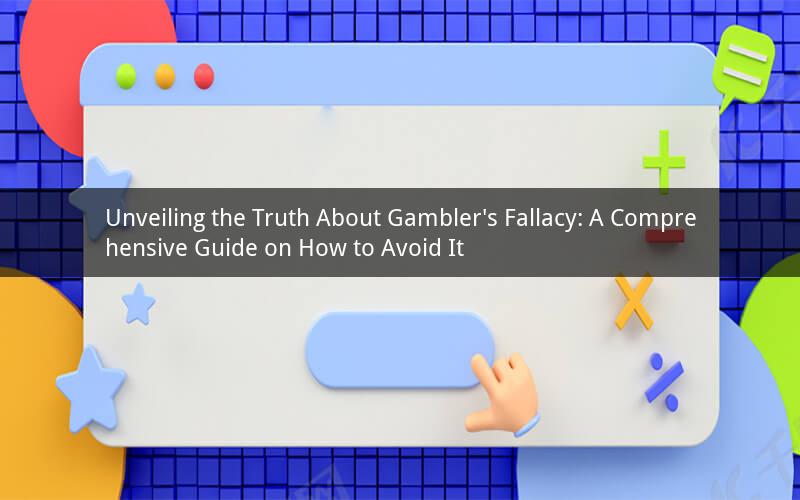
Introduction:
Gambler's fallacy, also known as the Monte Carlo fallacy, is a common cognitive bias that can lead individuals to make irrational decisions in various gambling situations. It is essential to understand how to avoid falling victim to this fallacy to make informed choices. In this article, we will delve into the origins of gambler's fallacy, its impact, and practical strategies to combat it.
Understanding Gambler's Fallacy:
1. Definition: Gambler's fallacy is the incorrect belief that if a random event has occurred more frequently in the past, it is less likely to occur in the future. For example, if a coin has landed on heads five consecutive times, some people may mistakenly think that the next flip is more likely to be tails.
2. Causes: Gambler's fallacy often stems from the lack of understanding of independent events and probability theory. People tend to rely on intuition and past events rather than objective chances.
3. Impact: The fallacy can lead to poor decision-making, financial loss, and psychological distress. It can also influence individuals to take unnecessary risks in various contexts beyond gambling.
Strategies to Avoid Gambler's Fallacy:
1. Embrace the Concept of Independence: Recognize that each random event is independent of the previous one. For instance, flipping a coin does not affect the outcome of the next flip.
2. Familiarize Yourself with Probability: Understand the concept of probability and calculate the chances of events occurring. This knowledge can help you make rational decisions based on actual odds rather than intuition.
3. Develop Critical Thinking: Analyze situations with a logical mindset and avoid relying solely on past events or hunches. Question the validity of your assumptions before acting on them.
4. Seek Reliable Sources: Consult expert opinions, statistical data, and reliable resources to make well-informed decisions. Relying on misinformation can reinforce the gambler's fallacy.
5. Practice Mindfulness: Stay present and focus on the current event rather than overanalyzing past occurrences. Mindfulness can help you make more rational decisions.
Case Studies:
1. The Coin Flipping Fallacy: In a coin flipping experiment, participants were asked to predict the outcome of the next flip after a series of previous flips. Despite knowing that each flip is independent, many participants fell prey to the gambler's fallacy by anticipating a different outcome based on past events.
2. The Lottery Fallacy: In a lottery drawing, individuals often believe that certain numbers are due to be drawn after not appearing for a long time. This belief is based on the gambler's fallacy, as each number has an equal chance of being drawn, regardless of past outcomes.
Conclusion:
Gambler's fallacy is a common cognitive bias that can affect decision-making in various contexts. By understanding its origins, impact, and effective strategies to combat it, individuals can make more rational choices. Embracing the concept of independence, familiarizing yourself with probability, practicing critical thinking, seeking reliable sources, and cultivating mindfulness are essential steps in avoiding the pitfalls of the gambler's fallacy.
Questions and Answers:
1. What is the gambler's fallacy, and why is it dangerous?
The gambler's fallacy is the incorrect belief that if a random event has occurred more frequently in the past, it is less likely to occur in the future. This fallacy is dangerous because it can lead to poor decision-making, financial loss, and unnecessary risks.
2. How can I avoid falling victim to the gambler's fallacy?
To avoid the gambler's fallacy, embrace the concept of independence, familiarize yourself with probability, develop critical thinking, seek reliable sources, and practice mindfulness.
3. Can the gambler's fallacy occur in everyday life?
Yes, the gambler's fallacy can occur in everyday life. For example, if you have a bad day at work and believe that your luck will improve the next day, you may be falling victim to the fallacy.
4. How does the gambler's fallacy affect financial decisions?
The gambler's fallacy can affect financial decisions by causing individuals to invest in high-risk ventures or make irrational investments based on past events, leading to potential financial loss.
5. Are there any specific techniques to combat the gambler's fallacy?
To combat the gambler's fallacy, you can employ techniques such as setting strict financial goals, seeking advice from financial experts, and maintaining a balanced investment portfolio. Additionally, practicing mindfulness and maintaining a rational approach can help mitigate the impact of the fallacy.